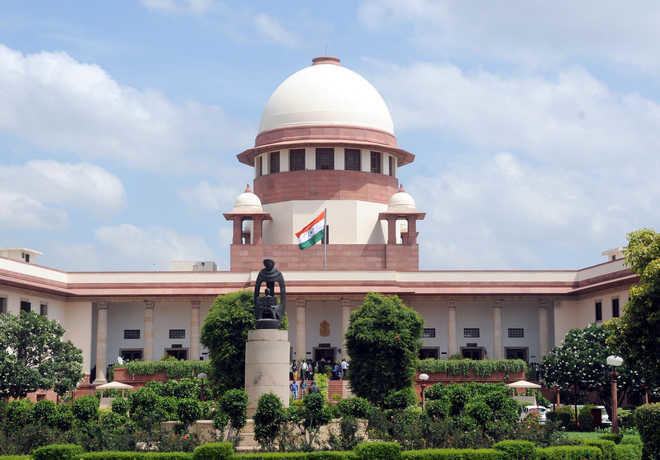Accused facing trial under UAPA can be granted bail, if trial moves at snail's pace: Supreme Court
Satya Prakash
New Delhi, July 19
A terror accused facing trial under the stringent provisions of the Unlawful Activities Prevention Act (UAPA), 1967, can be released on bail, if the trial moves at snail’s pace, the Supreme Court has ruled.
In April 2019, the top court had set aside the bail granted to Kashmiri Zahoor Ahmad Shah Watali by the Delhi High Court in a terror funding case filed against him by the National Investigation Agency (NIA).
In Watali’s case, it had held that bail in UAPA cases can’t be granted if there was a prima facie satisfaction of the court that the material on record proved the allegations and that it’s not permissible for courts to engage in a detailed analysis of prosecution case and to weigh the material before it, while considering bail.
However, a Bench of Justices JB Pardiwala and Ujjal Bhuyan on Thursday said, “This decision, that is, Zahoor Ahmad Shah Watali has to be read and understood in the context in which it was rendered and not as a precedent to deny bail to an accused undertrial suffering long incarceration with no end in sight of the criminal trial.”
The Bench ordered the release of accused Sheikh Javed Iqbal alias Ashfaq Ansari alias Javed Ansari who was arrested by the Uttar Pradesh Police on February 23, 2015 for allegedly engaging in the illegal trade of supplying counterfeit Indian currency notes in Nepal.
“We are of the considered view that continued incarceration of the appellant cannot be justified,” it said, setting aside the April 3, 2023 Allahabad High Court order that denied him bail.
Noting that the appellant was in custody for more than nine years and evidence of only two witnesses had been recorded, the Bench said, “In such circumstances, a reasonable view can be taken that the trial is likely to take considerable time.”
The Bench, however, ordered the trial court to impound Iqbal’s passport and/or citizenship document(s); told him not to leave the territorial jurisdiction of the trial court; furnish his address to the trial court and appear before the trial court on each and every date of the trial.
“In addition to the above, the appellant shall mark his attendance before the police station which the trial court may indicate once in every fortnight till conclusion of the trial. He shall not tamper with the evidence and shall not threaten the witnesses. If there is any violation of the bail conditions as above, it would be open to the prosecution to move the trial court for cancellation of bail,” it ordered.
For a person accused under the UAPA, getting bail is a difficult proposition for three reasons. First, Section 43D(5) of the UAPA says that notwithstanding anything contained in the CrPC, no person accused of an offence punishable under Chapters IV and VI of the UAPA shall, if in custody, be released on bail or on his own bond, unless the public prosecutor has been given an opportunity of being heard on the bail application.
Second, the proviso to Section 43D(5) says that such accused person shall not be released on bail or on his own bond if the court on a perusal of the case diary or the final report (charge sheet) made under Section 173 of the CrPC is of the opinion that there are reasonable grounds for believing that the accusation against such person is prima-facie true.
Third, Sub-Section (6) of Section 43D further clarifies that the restrictions on grant of bail specified in sub-Section (5) would be in addition to the restrictions under the CrPC or any other law for the time being in force on granting of bail.
However, the top court said, “In the given facts of a particular case, a constitutional court may decline to grant bail. But it would be very wrong to say that under a particular statute, bail cannot be granted. It would run counter to the very grain of our constitutional jurisprudence.”
It said, “This court has, time and again, emphasized that the right to life and personal liberty enshrined under Article 21 of the Constitution of India is overarching and sacrosanct. A constitutional court cannot be restrained from granting bail to an accused on account of restrictive statutory provisions in a penal statute if it finds that the right of the accused-undertrial under Article 21 of the Constitution of India has been infringed.
“In that event, such statutory restrictions would not come in the way. Even in the case of interpretation of a penal statute, howsoever stringent it may be, a constitutional court has to lean in favour of constitutionalism and the rule of law of which liberty is an intrinsic part,” the top court said.
UAPA cases
*Several activists, including former JNU students Umar Khalid and Sharjeel Imam, NewsClick founder Prabir Purkayastha, former Delhi University professor GN Saibaba and Gautam Navlakha are facing charges under the UAPA.
*The Centre has declared 57 individuals — including Maulana Masood Azhar, Hafiz Muhammad Saeed, Zaki-ur-Rehman Lakhvi, Dawood Ibrahim Kaskar, Gurpatwant Singh Pannun, Lakhbir Singh and Paramjit Singh — as terrorists under the UAPA.
*According to MHA data, total of 5,023 cases were lodged under the UAPA from 2018-22.
*The number of cases registered under the UAPA has gone up from 814 in 2021 to 1,005 in 2022.
*A total of 8,947 people were arrested under the UAPA from 2018-22 and 6,503 people were named in charge sheets while 550 accused were acquitted.









